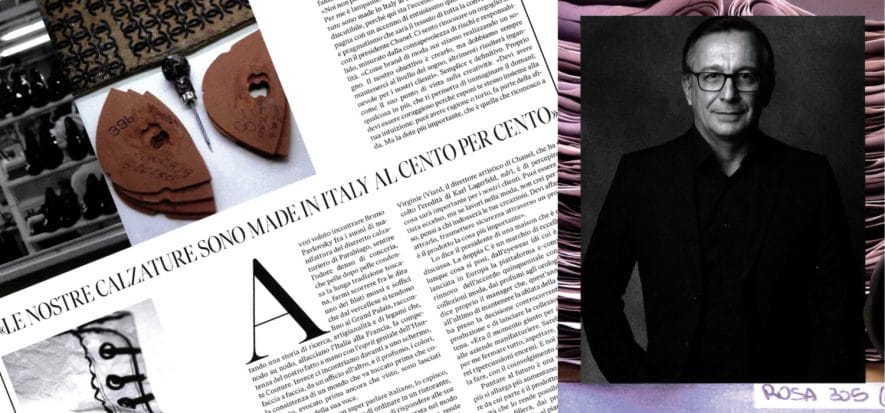Chanel relies on 1,000 suppliers, half of whom are Italians. How about shoes? They are all made in Italy. And how about tanneries they bought out (Samanta and Gaiera)? “Thanks to their highly specific expertise, we will be able to provide fashion industry with something which does not exist at the moment”. Such are the thoughts and words of Bruno Pavlovsky, 56, president of Chanel Fashion Division: while speaking to How To Spend It – Il Sole 24 Ore, he tells about Italian suppliers.
Chanel tells about Italian suppliers
Pavlovsky set off on an ideal journey around enterprises composing the supply chain of the French fashion house. During an interview given to the magazine published by Il Sole 24 Ore, he has praised Italy’s manufacturing skills. “Fortunately, we have several suppliers in Italy and our aim is not to buy them all of course!”, said Pavlovsky to begin with, clearly hinting at the latest buyout deal regarding Ballin Shoes, from Veneto. “Chanel is 50% made in Italy. Shoes are all manufactured in Italy. Only the creative process does not take place in Italy”. First artisans arrived, and we must preserve them, then more organized companies. Among others, for example, a few shoe factories, such as Roveda, based in Parabiago (1999), and Gensi, based in Giulianova (2015).
Fundamental excellences
Pavlovsky was asked to tell about Italian excellences which are fundamental to Chanel, and he answered the question willingly. He listed a few of them. “All of them are fundamental. Our task is to safeguard, in the next 20 years, the know-how which makes products unique”. For example, the ones created by Roveda (“I feel an extremely strong emotional connection”), Gensi (“The best as to classy and elegant sneaker manufacturing”), Corti and Mabi (“The best ones as to leather accessories making”). Not to mention Gaiera and Samanta tanneries: ““Thanks to their highly specific expertise, we will be able to provide fashion industry with something which does not exist at the moment”.
Support and ahead of the game
Throughout the lockdown period, explained Pavlovsky, Chanel decided not to stop production, in order to support its own supply industry. “It would have been a lot easier to stop everything and wait, but I would have caused, and still I would, huge repercussions and consequences”. From production to sales. “Our next generation buyers will actively enjoy a fully sustainable transformation, 100%: that is why we are supposed to be ahead of the game”. Together with Italian suppliers, of course.
In the picture, a screenshot of the interview published by How to Spend It – Il Sole 24 Ore
Read also:










